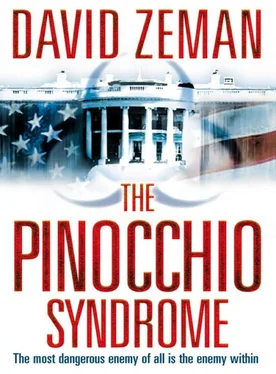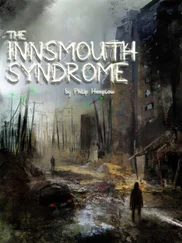‘Anyway, as it happens, I know a little something about this sort of thing. I did a double major in biochemistry and journalism in college. I’ve done a lot of reporting on diseases. This is definitely something new.’
Kraig shrugged. ‘If you say so. I’m not a doctor.’
She leaned forward, a hint of her clean-smelling cologne reaching Kraig, who smiled slightly.
‘Out here there are hundreds of victims,’ she said. ‘Each area is covered completely. But in Washington there is only one victim. The vice president of the United States.’
Kraig kept his poker face. But he knew she was right. If Everhardt had the same disease, dozens of others in Washington should have it by now. Something here didn’t add up.
‘Everhardt is a key to the president’s popularity. He’s big, he’s down to earth, he’s popular among men as well as women. It took the party a long time to come up with him as a running mate. Take him away, and the administration is a lot weaker with the voters. He won’t be easy to replace.’
Kraig was silent.
‘And what about the president’s political enemies?’ she asked. ‘What about Colin Goss? How does he feel about this turn of events?’
Kraig shrugged. ‘Am I supposed to have a reaction to that?’ he asked.
She crumpled the wrapper of the granola bar and threw it on the tray.
‘Something isn’t right,’ she said. ‘About Everhardt. And about this.’ She glanced around her at the deserted cafeteria.
Kraig said nothing.
‘I’m going to find out,’ she said. ‘With you or without you. When the time comes, it may be you asking the questions.’
‘Maybe.’ Kraig nodded.
‘I’m betting twelve years of journalism that you won’t like the answers,’ she said.
Picking up her coat, she left the cafeteria. Her shoulders looked very small under her sweater. A tired young woman, no doubt an incurable workaholic, who did not bother to hide her unhappiness.
Kraig liked her. There was a tranquil hopelessness about her that struck a chord in him. She had given up on something a long time ago – love? belonging? – and the emptiness it left behind gave her sharp definition as a person. The reporters he had known were shallow people, slaves to their own ambition. Karen Embry was a human being, albeit a scarred one.
Kraig wondered what she looked like without those clothes on. What her cologne smelled like closer up, when one’s lips were against her skin.
He hoped he would never see her again.
Washington
November 22
Susan Campbell was the only child of a wayward New Hampshire beauty queen and a philandering Boston blue blood named Lee Bellinger. Their marriage had lasted seven years. Susan was six when her father abandoned her mother. A series of boyfriends had followed, along with a desperate search for money that led ‘Dede’ Bellinger into brief forays into television, radio, advertising, and public relations, until her taste for alcohol and her notoriously poor driving ability got her killed in a one-car accident on the New Jersey Turnpike.
Susan was brought up by two straitlaced Bellinger aunts who sent her to the best private schools and offered her the combined wisdom of the Bible, the Farmer’s Almanac , and Ralph Waldo Emerson as a guide for living. At fourteen she entered Rosemary Hall as a thoroughly confused young girl with braces, skinny legs, and a worried look.
Four years of private school in the company of privileged girls from the best families in the nation did little for her confidence. She was a shy freshman at Wellesley when a friend introduced her to Michael Campbell, a Harvard junior who was about to undergo a second serious spinal operation after his first one had failed. Michael was frightened; Susan took it upon herself to encourage him. It was in that gesture of giving that she became a woman.
By the time Susan caught her breath Michael had won two Olympic gold medals and was a national celebrity. He finished law school two years after the Olympics, and two years after that ran successfully for the Maryland state legislature. By now Susan was his wife, and she helped him campaign for the US Senate. Her extraordinary blond beauty made her an attractive partner for him on the campaign trail. She had worked her way through college as a catalog model specializing in sportswear and lingerie, and for several years her scantily clad image was on every package of silk panties sold under the exclusive S/Z brand name. That image still haunted her, for the feature articles on her in women’s magazines often included it.
Susan was too beautiful for a political wife, and too shy. Michael’s campaign advisors did not quite know what to do with her.
Then something happened that changed Susan from a minor asset to a crucial weapon in Michael’s political arsenal. She was invited to be a guest on The Oprah Winfrey Show . At Oprah Winfrey’s request Susan brought along the photo album that documented her early years with Michael.
A small comedy of errors took place as Oprah’s camera was zooming in on the photo album.
‘Now, what does this show?’ Oprah was asking.
‘That’s Michael holding the flowers he brought me after our first fight,’ Susan said.
‘Fight?’ Oprah looked at the camera. ‘What were you fighting about?’
‘Sex.’ Susan blurted out the word before she could stop herself.
‘Sex?’ Oprah scented an opportunity.
‘Yes. He thought I was too straitlaced about it.’ Susan stopped in mid-sentence. ‘Uh-oh. I guess I shouldn’t have said that.’
‘Not at all,’ Oprah pursued. ‘Straitlaced in what way?’
‘Making out in public. Things like that,’ Susan said.
‘Oh, you mean you’re more reserved than he is?’ Oprah asked.
‘Yes. I’m rather shy,’ Susan said. ‘It comes from my New England background, I guess.’
‘And Michael isn’t?’ Oprah asked.
Susan laughed. ‘No. Michael isn’t shy.’
‘What sort of venue are we talking about?’ Oprah asked.
‘You mean for making out?’
‘Making out. Yes.’ Oprah glanced at the audience.
‘On the beach in the moonlight,’ Susan said. ‘That sort of thing.’
‘So he likes to take risks,’ Oprah prodded.
‘Risks? Well, he’s very romantic in general, but, yes, I suppose you could say he likes to take risks.’
‘How far do you think he would go?’
‘You mean if he thought no one was watching?’ Susan asked.
‘Mmm – yes,’ Oprah agreed.
‘Oh, the fifty-yard line at the Astrodome, maybe,’ Susan said. Her hand went to her mouth instantly, but it was too late. The audience was in hysterics.
‘Oh, shit,’ Susan said, blushing.
And that was the final note, her embarrassed use of profanity. The audience’s laughter was mingled with applause. Viewers had never seen a politician’s wife speak with such spontaneous candor before.
The clip became famous. Not only did it show off Susan’s unpredictable personality and her charm, but it also referred to her sex life with one of America’s most desirable men, a man whose handsome body was known to women all over the world.
At first Michael’s public relations men were horrified. The sight of Susan on the Oprah show with her profane comment bleeped out seemed a disaster of limitless proportions. But Michael’s tracking polls went up instead of down in the weeks after the broadcast. As for Susan, she was now famous in her own right. She had become a major positive overnight.
At age thirty-two Susan found herself not only the wife of a US senator and the darling of the press, but also a member of a complex and difficult family. Judd Campbell, whose willfulness had done permanent damage to his relationships with Michael’s siblings, loved Susan and had co-opted her as a surrogate daughter. In more ways than one Susan felt exposed and off balance. But she had no choice. She had cast her lot with Michael, and she could not look back.
Читать дальше












